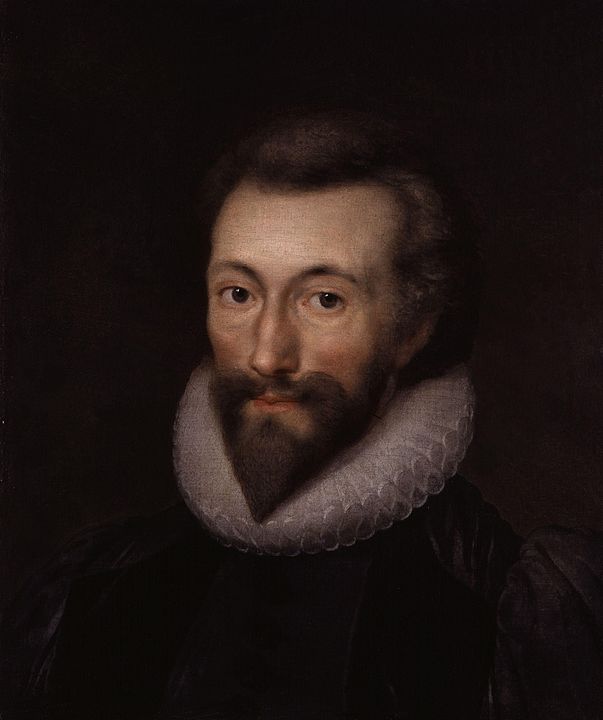
John Donne’s poem “Batter my Heart” or “Holy Sonnet 14” is a tour de force spiritual quest. In it, the speaker, who appears to be Donne himself instead of a persona, is torn between his love and God and questioning his own faith. The poem is a sonnet which follows a typical Italian or Petrarchan style in that it has a rhyme scheme of ABBA ABBA CDCD EE and that it is broken into an octave and a sestet and is further broken up into four sentences. We will look at the sonnet’s sections to take apart the imagery being used to describe Donne’s spiritual torment.
The first section is Donne demanding more of God’s presence. While God’s presence is currently described as being gentle and reparative, Donne needs more, he needs to be destroyed in order to be rebuilt. There is a sense here that Donne cannot not go any further or get any better unless he is beaten down in some way. The words “batter,” “beat,” and “blow” are used to describe what Donne wants and should be noted. The words work in two ways to deliver their message to the reader. The first is in their meaning, as each of the words in their own right means to be destroyed. The other way they work is the alliteration of the “b” sound which is percussive and audibly carries home the message of the beating that Donne is requesting. These words also counter the words used to describe God’s current attitude. All told, Donne is currently unhappy about something and requires a more forceful attitude from God as if saying ‘God, you are too gentle, please be rougher on me.”
Moving on to the second section, the imagery is changed up as we now see Donne described as a town where the leadership was overthrown. The previous leadership was God’s viceroy, or rather Donne’s own faith in God. Where faith used to stand there is now doubt and maybe even sin and guilt. With this shift in imagery we think of Donne’s faith as defenseless and the result is a restless man wanting peace with himself. In this chaos we get a sense that something is corrupt or at the very least abnormal. What sticks out the most is the line “Labour to admit you, but oh, to no end.” Labour implies hard work that can be physically and mentally exhausting. This tell us that Donne doesn’t want to just give up and give in, he does truly desire a change in his faith instead of allowing himself to remain this “weak or untrue” state. It is like he is fighting to prove himself to God but doesn’t feel that he is succeeding. There is one thing than could help him though, which he describes in the last section.
Moving on to the sestet and the last of the sections we see the internal battle reaching its peak as it changes imagery once more to something more sexual. Donne’s frustration is clear as he exclaims that not only does he love God, but he loves him more than is required of him. The solution, which is an echoed elaboration of the first stanza, is that God needs to be more forceful. Words like “betroth’d,” “divorce,” and “knot” seem innocent enough in their reference to a marriage-like bond with God. However, the words “imprison,” “enthrall,” “chaste,” and “ravish” are much less innocent and much more vigorous. If the first set of words hint at an innocent marriage like proposal, the second set seems to hint at an perverse consummation between God and Donne. “Enthrall” and “ravish” both have ties to the word “rape” and “imprison” doesn’t help ease those connotations. While Donne doesn’t seem to be saying that he wants to be forced into being God’s sex slave, there is a very strong sense here that Donne wishes to get rid of his self-autonomy; that he couldn’t fail in the lord’s eyes if he was merely the lord’s puppet.
To conclude, John Donne’s “Batter my heart” or “Holly Sonnet 14” poem is a man’s desperation as he tries to win back God’s love. It is perhaps important to realize that we have no reason to believe that God doesn’t already love this man, it is only through the speaker’s own eyes that we are led to believe that he is unworthy. While the poem is in the first person with Donne himself most likely the speaker instead of a persona, it could be seen in a more general way. Instead of it being a single man battling with faith it could be speaking about mankind in general as trying to prove their worthiness to God. Either reading gets you the same impression though. For this person (or persons) to be fully redeemed in their own eyes they need God to show his presence in some way and completely take them over. The poem is Christian in nature; however, I believe that people of any religion could have periods where the poem would resonate with them. As if they were weak in their fate for a moment or felt as though their belief was being tested. The poem reads as if John Donne was screaming this to the heavens and awaiting a reply; hopefully, he got one.